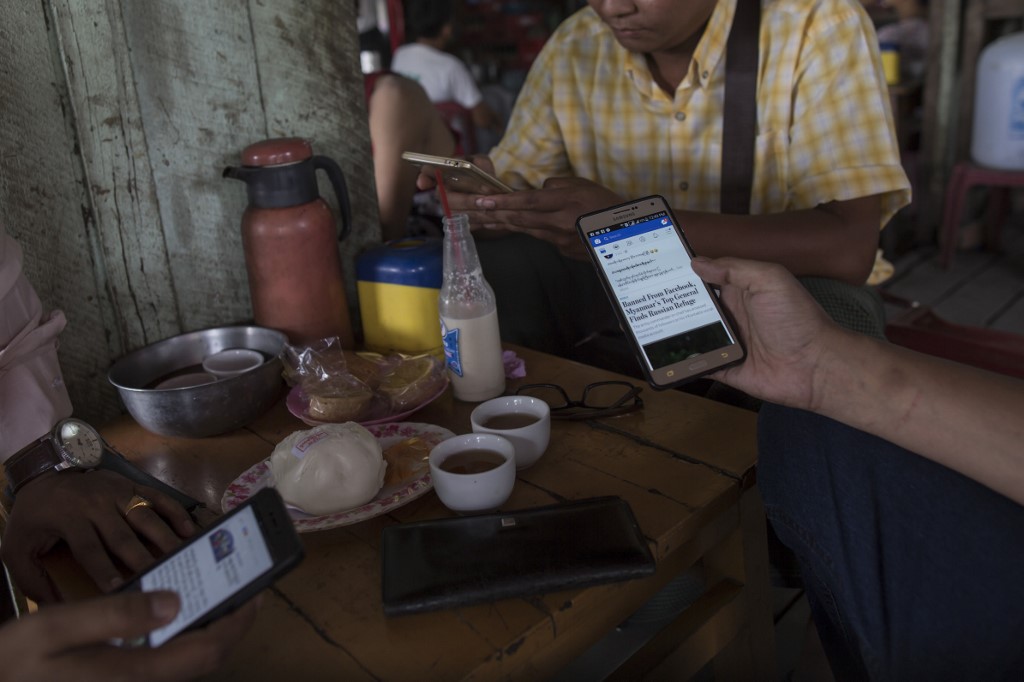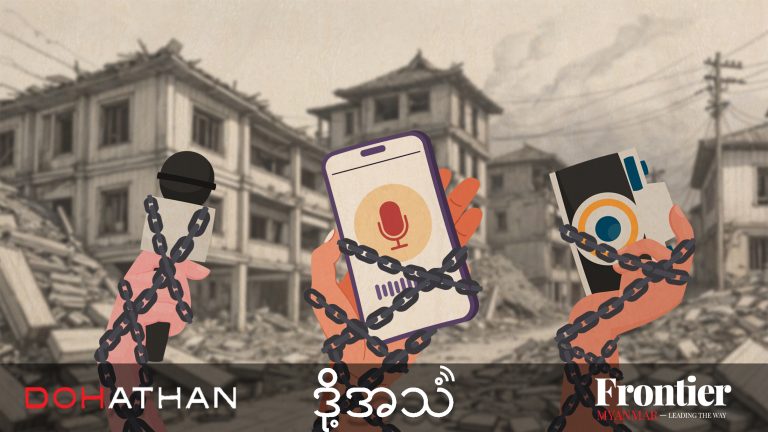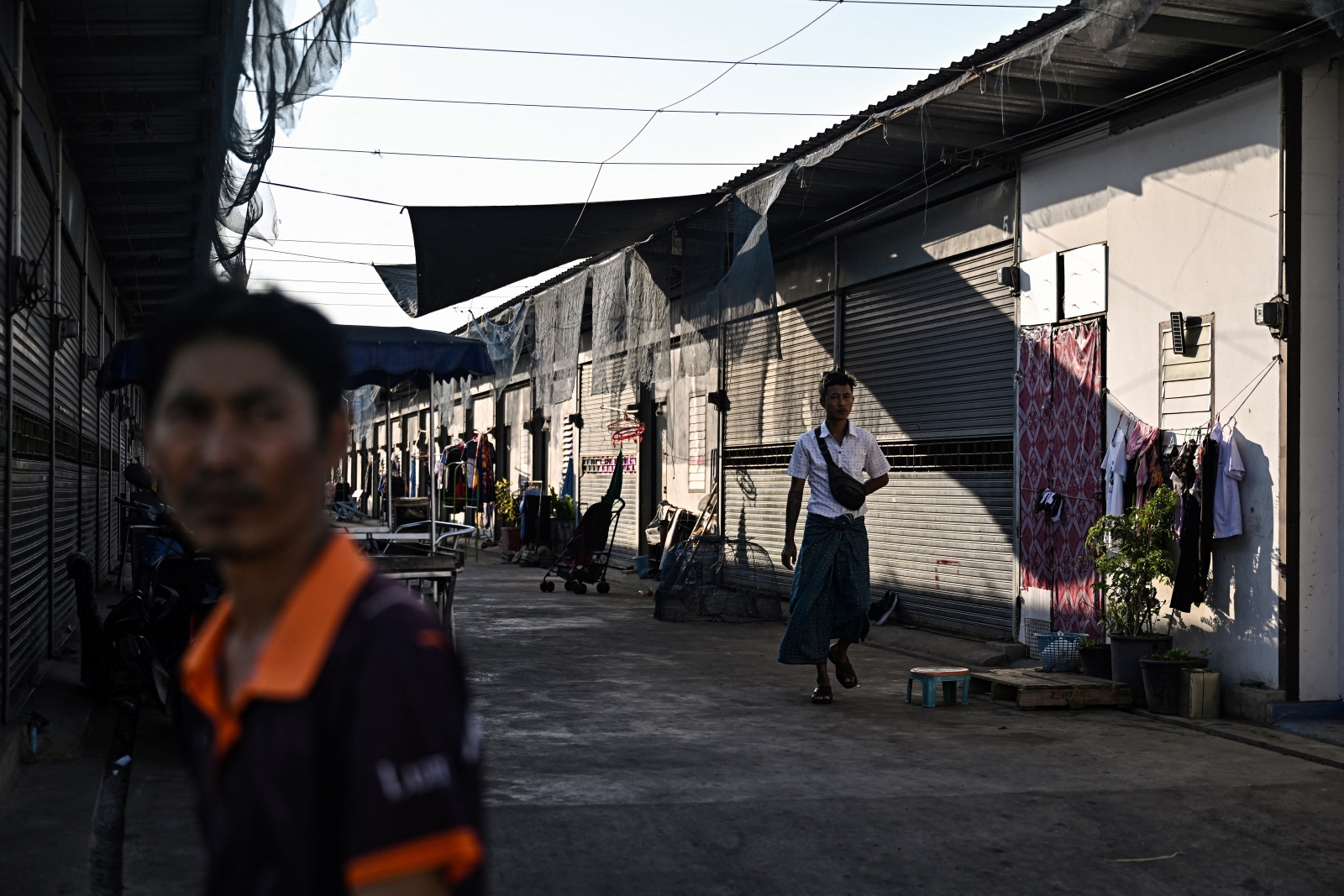Myanmar became an infamous example of disinformation run amok during the violent Rohingya crisis in 2017, with Facebook accused of helping to foment genocide. With November’s election fast approaching, has the social media giant learned its lesson?
By BANYAR KYAW, PHONE HTET NAUNG and ANDREW NACHEMSON | FRONTIER
In November 2015, when Myanmar held its first democratic election since the early years of independence, it was still emerging from decades of isolation and censorship.
Although social media was slowly spreading to the general population, there were only 4.7 million active users in July 2015. Since then, internet use has exploded. By 2017, Myanmar was estimated to have over 22 million Facebook users, roughly half of its population.
Facebook played a key role in driving popular support for the violent crackdown on the Rohingya, who were subjected to a brutal campaign of murder, sexual violence, and arson. As the military ran rampant over the Muslim minority in northern Rakhine State, disinformation moved through the online ecosystem, spreading false stories against the Rohingya, such as claims that they burned down their own homes.
Elections are a notorious lightning rod for disinformation campaigns, and with Myanmar’s next polls only two months away, preparations are being made to combat disinformation. While progress has been made since 2017, dangers still remain.
US election observer the Carter Center said in 2015 it “noted that the use of social media was increasing significantly,” but “disinformation was not identified as a major concern”. At the time, anti-Muslim hate speech specifically had drawn more attention. The Carter Center said there is “an expectation that disinformation and fake accounts, specifically on Facebook, would escalate in the run-up to the 2020 elections.”
Since 2015, the Carter Center said social media use, especially Facebook, has increased “exponentially” to 24 million Facebook users. According to Polish digital marketing company Napoleon Cat, that exponential growth has become even more pronounced in recent months, jumping from 24 million in March to 28.5 million in July.
With COVID-19 placing serious restrictions on in-person campaign events, there is an expectation that social media will play an even bigger role in this year’s election. “We expected (Facebook) to be a very significant campaign ground and expect (it) to be an even more significant campaign ground now,” said Mr Rafael Frankel, Facebook’s director of public policy in Southeast Asia.
The Carter Center has already observed social media posts “that appear to have been created to mislead voters about the record or actions of different political parties and their supporters” and expects an increase now that the campaign period has officially begun. The Carter Center said it won’t counter disinformation but that it instead “monitors, analyzes and reports on its occurrence and impact to relevant authorities and stakeholders”.
Fact-checking organisations Boom Myanmar, Fact Crescendo, Myanmar Now, Real or Not and Think Before You Trust have debunked 100 politically motivated pieces of disinformation in July and August this year, most of which targeted the ruling National League for Democracy.
But while stakeholders such as Facebook and the Carter Center have vigorously prepared for disinformation in the election, political parties don’t seem to have a particularly clear plan.
Parties unprepared
Sai Kyaw Nyunt, spokesperson for the Shan Nationalities League for Democracy, said his party expects “a lot of disinformation” but has done “nothing special” to prepare for it. “Our party’s youth committee is active online and they are watching what happens on Facebook every time,” he said, adding that the SNLD doesn’t plan to respond to attacks.
This could actually be the right call. Some researchers believe that exposing and fighting disinformation can help it spread, as some readers will still believe that it’s true. In Ms Claire Wardle and Mr Hossein Derakhshan’s report, Information Disorder, they warn that “debunks themselves can be considered a form of engagement” which “provide additional oxygen” to false stories.
Sai Kyaw Nyunt believes that the general population is intelligent enough to sift through false claims, although the historic efficacy of misinformation in Myanmar and globally suggests otherwise. “There are no major concerns. Fake news will only be believed by those who want to believe it,” he said.
The NLD is taking the threat more seriously, but also didn’t offer a particularly clear plan to combat it. “If we do not investigate, people will be manipulated,” said spokesperson U Myo Nyunt. “One of their strategies is that they mix the wrong information with the right one,” he said.
The NLD has formed a social media monitoring team, but it is primarily tasked with observing the party’s own candidates. “If their posts are not in accordance with the electoral laws, or if they attack other parties or candidates, then we immediately ask them to delete,” Myo Nyunt said.
Asked who the primary spreader of misinformation was, Myo Nyunt declined to comment, but said people know who the culprit is. Both Facebook and the Carter Center also declined to single out any specific organisation. But of the six coordinated inauthentic behaviour campaigns Facebook has removed from its platform in recent years, three were explicitly connected to the Myanmar military and one was linked to the police.
The military-aligned Union Solidarity and Development Party declined repeated requests to be interviewed for this article.
The newly-formed People’s Pioneer Party says it has encountered a common problem with disinformation: people simply don’t care about the truth. The party was founded last year by Daw Thet Thet Khine. The gem magnate and former NLD lawmaker, who was expelled from the party for criticising it publicly, has faced frequent personal attacks online.
“The party has been attacked by a lot of wrong information, such as that PPP collaborates with the military, is subordinate to the USDP, and so on,” said spokesperson U Kaung Min Khant. He said one rumour claimed PPP had paid singer Yone Lay to make a controversial music video that portrayed Senior General Min Aung Hlaing saving State Counsellor Daw Aung San Suu Kyi. In other instances, Kaung Min Khant said Thet Thet Khine’s photos have been photoshopped with quotes that she did not say. Frontier has also observed a trend of sexist attacks targeting Thet Thet Khine online.
Kaung Min Khant said they tried to combat this by providing correct information. “However, they do not want the right information,” he said.
Not on the same page
Facebook has introduced some new tools to combat disinformation, after being castigated for its role in the Rohingya crisis. Frankel said many of the changes Facebook has made to its global policies were based on lessons learned from how the platform was “abused” in Myanmar. He said the social media giant has “over 120 content reviewers” focusing specifically on Myanmar and a team that has been “meeting for many, many months”.
The platform’s top objectives are to: limit the spread of harmful misinformation, prevent voter suppression, combat hate speech, make political ads more transparent and prevent election interference. Many of Facebook’s new strategies do seem promising. Facebook claims its artificial intelligence-based tool for proactively detecting hate speech has made great progress, and it has also introduced an “Image Context” product that alerts users if they are sharing an old or out of context image. Forwarding information via Messenger has also been limited to five recipients at a time, to avoid mass sharing of disinformation.
However, reports of malfeasance continue to dog Facebook, with rights activists accusing the platform of “obstructing” an investigation into whether Myanmar committed genocide against the Rohingya. The Wall Street Journal also recently revealed that a top Facebook executive had allowed an Indian politician to skirt regulations on hate speech, after posting comments calling for Rohingya refugees to be shot.
Facebook is well aware that it will be under major scrutiny in the coming months. “We’ve put a huge amount of effort and resources into ensuring that Facebook is a positive force for the people in Myanmar and I think that work will speak for itself over time,” Frankel said.
Another challenge in fighting disinformation is that stakeholders aren’t always on the same page. The Union Election Commission has threatened legal action against proponents of the “no-vote” movement, a loose collection of Facebook groups and accounts advocating against voting in the November election. Facebook, however, said it considers such a campaign to be “protected political speech” and would not take action unless it was discovered to be an inauthentic movement. “We’ve looked into it and so far we have seen no evidence of that,” Frankel said.
The People’s Alliance for Credible Elections, Myanmar’s largest domestic election monitor, said it will be focusing on issues of voter suppression, which is a particular concern now that COVID-19 infections are surging. Executive director Sai Ye Kyaw Swar Myint said he is on the lookout for disinformation claiming that the election date has been changed, or rumours of COVID-19 outbreaks in specific polling areas spread with the intent to dampen turnout. He said combating misinformation is “quite new for all of us, and quite challenging, too”.
Government policies to tackle misinformation have also invited criticism. The government has ordered dozens of websites blocked for allegedly spreading “fake news” – a term many recommend no longer using. Information Disorder argues that the term has been “appropriated by politicians around the world to describe news organisations whose coverage they find disagreeable” and is being used as a justification to “undermine … the free press”.
This may be exactly what the Myanmar government intends. Some of the websites it has blocked are critical but credible sources of information, such as news outlets Narinjara and Development Media Group, both based in Rakhine, and activist group Justice For Myanmar. Although the government may see this as combatting disinformation, others view it as a violation of freedom of speech and a free press.
Myo Nyunt, the NLD spokesman, also called for the information ministry to require people to register personal information to use SIM cards to help prevent disinformation. The policy, which is already being rolled out, has also been steeped in controversy. Norwegian telecommunications company Telenor released a statement apologising for disconnecting “millions” of SIM cards across Myanmar, calling it a “painful but necessary process.”
Free speech activists, however, warn that such a plan can result in privacy violations, mass surveillance and self-censorship. It may also further marginalise the most vulnerable, leaving undocumented people unable to access information.
“SIM card registration facilitates mass surveillance … which can potentially be misused for example to target political opposition,” Free Expression Myanmar said. While working on a previous story, a source recently told Frontier they felt uncomfortable talking over the phone, because they used a SIM card from the government-run Myanma Posts and Telecommunications.
Sai Ye Kyaw Swar Myint of PACE said there “should be a clear distinction between disinformation and free speech.”
“We need to be able to criticise the government’s actions, but the government might claim those criticisms are disinformation,” he said. “We have concerns about how the government defines misinformation.”







